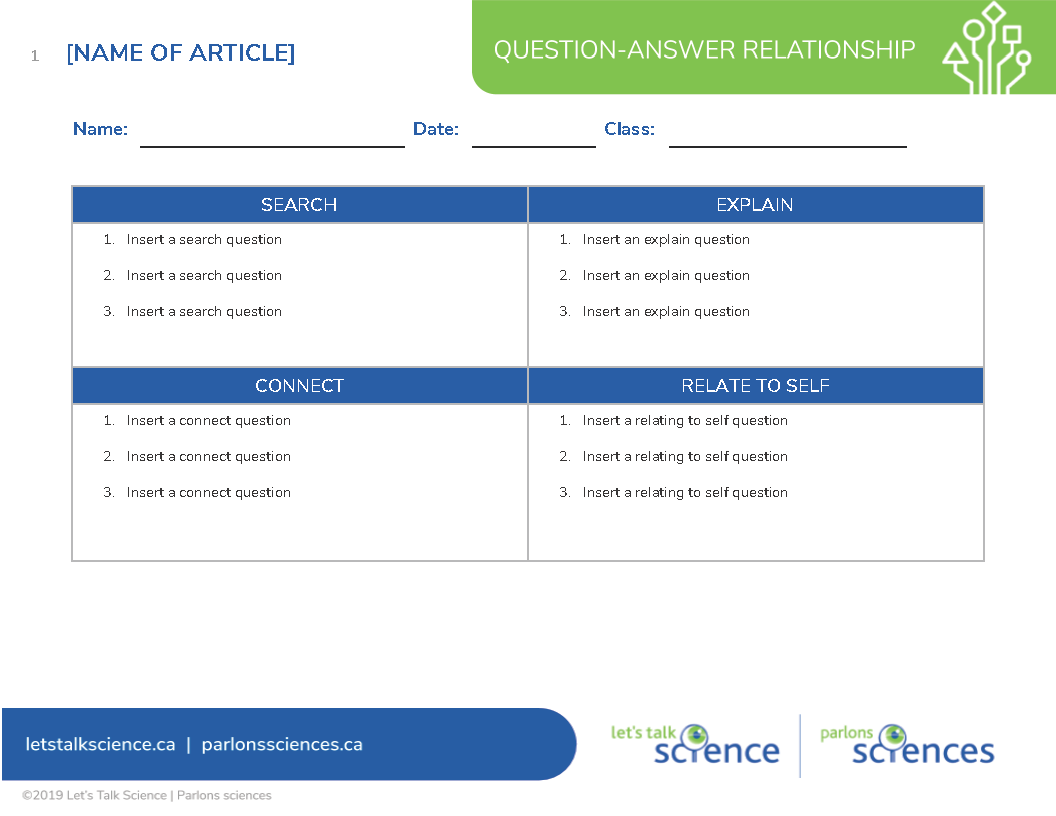Question-Answer Relationship

Question-Answer relationship icon (DrAfter123, iStockphoto)

Question-Answer relationship icon (DrAfter123, iStockphoto)
This strategy helps students reflect on new content by asking questions that require different thought processes.
Why use it?
- To consolidate learning after reading or viewing new material
- To demystify the questioning process
- To go beyond simple ‘right-there’ information in a text or video
- To interact more deeply with a text or video by connecting it to personal knowledge and experiences
Tips for success
- Students may need some support with understanding the four types of questions.
How do I use it?
- Have students view a chosen video or read a chosen article.
- Provide each student with the Question-Answer Relationship template to use with the video or article. You may want to provide a starter question in each category in the template (see examples in the Ready-to-Use section below).
- Discuss the four categories of questions and what the categories mean. As you do so, look at sample questions in each category as you discuss their characteristics; for example:
- SEARCH questions are at the literal level; the words used to form and answer the question are typically in the same sentence. Question starters can include “What is…?,” “Name the…,” “List…,” etc.
- EXPLAIN questions require students to think about information in the entire text or video. Question starters can include “Describe…,” “Compare…,” “Explain…,” “Summarize…,” etc.
- CONNECT questions require students to connect their prior knowledge with information from the video. Question starters can include:
- What evidence in the text supports what you think about…?
- Based on the information, what do you think about…?
- How does what you have viewed compare to other articles about …?
- RELATE TO SELF questions are personal questions based on the video, but do not require specific information from the video. Question starters can include:
- What have you experienced that was similar to this?
- What can you do about …?
- What are some …that you have seen yourself?
- Once you are confident that the students understand the four types of questions, have them complete the Question-Answer Relationship BLM.
- Students can exchange their completed questions with a partner, and the partner can answer the questions.
Variations
- Students could develop the questions in pairs or in small groups rather than individually.
Extensions
- Some of the student-generated questions could be used for whole-class quizzes.
Using this Strategy
- Question-Answer Relationship Reproducible Template [Google doc] [PDF]
- How Do We See Colour?: Question-Answer Relationship Reproducible [Google doc] [PDF]
- How Sugar Affects the Brain: Question-Answer Relationship Reproducible [Google doc] [PDF]
- The Milky Way: Question-Answer Relationship Reproducible [Google doc] [PDF]
- Understanding the Teen Brain: Question-Answer Relationship Reproducible [Google doc] [PDF]
- Why do People Get Hangovers?: Question-Answer Relationship Reproducible [Google doc] [PDF]
- Why is ketchup so hard to pour : Question-Answer Relationship Reproducible [Google doc] [ PDF]
- Why is the Weather so Hard to Predict?: Question-Answer Relationship Reproducible [Google doc] [PDF]
- Why Your Doctor is So Interested in Your Pee : Question-Answer Relationship Reproducible [Google doc] [PDF]
Create Your Own
- Question-Answer Relationship Reproducible Template [Google doc] [PDF]
Ready to Use
- How Do We See Colour?: Question-Answer Relationship Reproducible [Google doc] [PDF]
- How Sugar Affects the Brain: Question-Answer Relationship Reproducible [Google doc] [PDF]
- The Milky Way: Question-Answer Relationship Reproducible [Google doc] [PDF]
- Understanding the Teen Brain: Question-Answer Relationship Reproducible [Google doc] [PDF]
- Why do People Get Hangovers?: Question-Answer Relationship Reproducible [Google doc] [PDF]
- Why is ketchup so hard to pour : Question-Answer Relationship Reproducible [Google doc] [ PDF]
- Why is the Weather so Hard to Predict?: Question-Answer Relationship Reproducible [Google doc] [PDF]
- Why Your Doctor is So Interested in Your Pee : Question-Answer Relationship Reproducible [Google doc] [PDF]
References
Barton, M. L., & Jordan, D. L. (2001). Teaching reading in science: A supplement to the second edition of teaching reading in the content areas teacher's manual. Mid-continent Research for Education and Learning.
